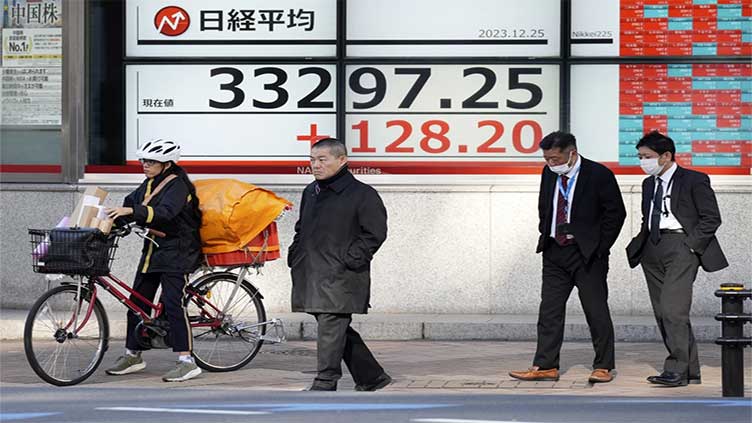More weakness in technology companies pulls Wall Street lower

Business
More weakness in technology companies pulls Wall Street lower
NEW YORK (AP) — Stocks are opening lower on Wall Street as weakness in technology companies continues to drag on the market. The S&P 500 was off 0.3% in the early going Wednesday. The tech-heavy Nasdaq gave up 0.5% and the Dow Jones Industrial Average slipped 153 points, or 0.4%. Palo Alto Networks was a big loser. The network security company lost a quarter of its value after giving forecasts for future billings that came in well below what analysts were looking for. Amazon rose following an announcement that it would be added to the Dow. Walgreens Boots Alliance, which is leaving the Dow, fell.
THIS IS A BREAKING NEWS UPDATE. AP’s earlier story follows below.
Wall Street inched lower early Wednesday while markets waited for Nvidia’s quarterly earnings release, which could serve as a litmus test for the AI chip revolution.
Futures for the S&P 500 dipped 0.3% before the bell and futures for the Dow Jones Industrial Average fell 0.2%.
Nvidia’s report, which will come out later in the day, will put stock markets in Hong Kong, China and Taiwan on alert as these three regions contributed over 45% of the company’s revenues in the third quarter.
Nvidia slipped about 1.5% in premarket trading following a tumble of 4.4% Tuesday, which weighed down the entire sector. It’s still the S&P 500’s biggest gainer so far this year, rising about 40% and pushing it to a size that equals Amazon.
Security software maker Palo Alto Networks was the biggest premarket loser, skidding 24% before the bell after it cut its 2024 sales and billings guidance.
Amazon rose less than 1% in off-hours trading after Tuesday’s announcement that the e-commerce giant was joining the Dow Jones Industrial Average. Amazon will replace drugstore operator Walgreens Boots Alliance in the Dow before the open of trading on Monday, S&P Dow Jones Indices said.
HSBC Holdings reported its profit before tax reached a record of $30.3 billion in 2023 on Wednesday, but still fell short of analysts’ expectations as the revenue growth was offset by the recognition of an impairment charge of $3 billion relating to the investment in a Chinese bank. HSBC’s Hong Kong-listed shares fell 3.8% in afternoon trading.
Later Wednesday, the Federal Reserve will release the minutes from its most recent meeting, where it opted to leave its benchmark lending rate alone for the fourth time in a row. Investors have all but lost hope that the central bank will cut rates at its March meeting.
At this point, Wall Street is now looking for its first rate cut to come in June, months later than earlier anticipated. Investors have to wait until next week for another key update on inflation. That’s when the government will release its monthly report on personal consumption and expenses, the Fed’s preferred measure of inflation.
More than 80% of companies in the S&P 500 have reported their latest results. Analysts polled by FactSet expect overall earnings growth of about 3.3% for the fourth quarter and are forecast earnings growth of about 3.6% for the current quarter.
Hong Kong’s Hang Seng gained 1.6% to 16,503.10, driven by gains in its Tech Index, which advanced 2.7%. The Shanghai Composite rose nearly 1.0% to 2,950.96.
Japan’s benchmark Nikkei 225 lost nearly 0.2% to 38,300.00.
Japanese exports rose by a higher than expected 11.9% in January from a year earlier, driven by strong demand for chip-making machinery in China and solid gains in exports to the United States and Europe, according to data released Wednesday.
Australia’s S&P/ASX 200 slipped 0.7% to 7,608.40 despite data from the Australian Bureau of Statistics showing the country’s wage index increased by 4.2% compared to the same period a year before, marking the highest recorded annual increase since early 2009.
South Korea’s Kospi lost 0.2% to 2,653.31.
In Europe at midday, Germany’s DAX added 0.4%, the CAC 40 in Paris gained 0.2% and London’s FTSE 100 was down 0.8%.
In other trading, U.S. benchmark crude lost 18 cents to $76.86 a barrel in electronic trading on the New York Mercantile Exchange. Brent crude, the international standard, gave up 18 cents to $82.16 per barrel.
The U.S. dollar barely budged to 149.99 Japanese yen from 150.01 yen. The euro was unchanged at $1.0807.
On Tuesday, the S&P 500 fell 0.6%, coming off only its second losing week in the last 16 after a holiday on Monday. The Dow Jones Industrial Average fell 0.2% and the Nasdaq composite fell 0.9%.


